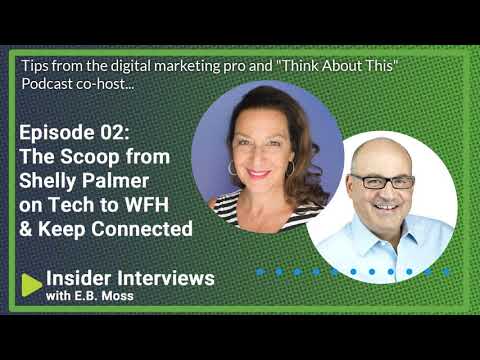Shelly Palmer's Inside Scoop on Using Tech to WFH and Keep Connected

One of the smarter ideas I've had recently was to invite the even smarter Shelly Palmer to guest on the Insider Interviews podcast. I had an ulterior motive: I'd been challenged by my WFM (work from home, in case you haven't been) tech set-up — and needed help. Palmer is, arguably, the go-to guy for keeping us all on point. Palmer, of CNN, CNBC, Fox 5 NY contributor fame, has been helping companies with their "digital transformation" for 25 years. He was also rated the Top Voice in Technology by LinkedIn in 2017.
I encourage you to listen to the complete podcast here, or subscribe and listen on Apple Podcasts, Google Podcasts, Spotify, and, well, almost anywhere, to hear all his recommendations.
I learned a lot about soundwaves, personal tech stacks, and his own podcast on the Westwood One network, Think About This with Shelly Palmer and Ross Martin – oh, and if a relationship with an artificial companion could be in my future.
On the serious side, Palmer has been diligently donating content through his nascent tech-focused social networking platform, PGX — already about 2000 members strong — and frequent Zoom meetings to help today's WFH population work smarter and stay physically and mentally healthier. His robust list of resources continues to evolve with each webinar, supplementing his "Alone Together" interactive discussions on Wednesdays and weekly emails.
I spoke with Palmer from my kitchen desk (which he informed me is not optimal for audio), and he from his Vermont vacation home, where he'd meant to be for just a weekend or so.
Our meandering conversation went from solid, scientific advice to musings, fun anecdotes about his time with family and the podcast with Martin, to his most recent Socratic online chat about what a post-coronavirus society might look like, as Palmer is not averse to airing strong opinions without much prompting. Here are some of the takeaways, edited for brevity and clarity.
On Choosing One Tech Tool Over Another
"In some cases, it's just personal preference. In others, it has to do technologically with where you are and what you're trying to do." He uses Zoom for meet-ups with 150 or so attendees and Webinar Jam for one-to-many. He was trepidatious about "crowd control" with Zoom and keeping "chat" open, but, he says, "everybody has been super respectful, either virtually raising their hands by clicking a button, or actually raising their hands because they're on video. I was surprised in every case over the last two weeks, how people are so quickly adapting to and evolving into good citizens in video chat. So, apparently, you can teach old dogs new tricks."
On Adapting to Technology
"People have been accepting of technical glitches that you would never have accepted before. It reminds me of the change when smartphones [drove] vertical video. It's been fascinating to see the speed with which people are willing to adopt bad lighting, bad camera angles, and bad hair, and I think it's fantastic because the most important thing is that we figure out how to be social animals in a time when coronavirus is forcing us to be less social."
On Using a Personal Tech Stack More Personally
"The tech stack that's [at your home] will, ultimately, evolve as Amazon starts to ship again..., but for people who want to communicate using audio and video through their technology, here's what you need quickly:
"A workspace that is conducive to working, and that you consider only for work — [because] you need a way to know psychologically, sociologically, physiologically you are working. I can walk away from that space. And when I'm in that space other cohabitants understand that I'm in my workspace. There's a giant difference between being home and working from home. Some people keep their computer just for work in that space and use an iPad or their phone in the living room to text their friends or keep Facebook open.
"I take breaks every 45 minutes. I take lunch every day. I have a quitting time. You need the mind, the body, and the spirit all lined up and take care of the whole human.
"If you're working for a bigger corporation, they will likely dictate the virtual private network and what office suite you're going to use. [A good choice] for small collaborative companies is Google Suite — Google apps, Google Docs are truly interactive, as are Google Sheets, their version of Excel, and you can chat through Google Hangouts and have Slack running, so you can interact with clients without having to send email. A lot of clients are using Microsoft Teams, which is their version of Slack. Microsoft is offering that free right now, trying to take advantage of the people working at home.
"But when you're working totally by yourself right now, the most important thing you can do, I think, is [to] send an email or a text message to everybody you know in the world and find out how they're doing."
On Staying Connected
"You have to electronically [connect]. And it does require a cultural and psychological shift for those who say, 'I'm not a Facebook person,' or 'I'm not a LinkedIn person,' [but] your passion project now is to be part of a larger world electronically, and it's very time-consuming. So, my number one recommendation to everybody is don't worry about the technology: text, smoke signals, carrier pigeon, skywriting.... Just get out there to everybody and say, 'Hey, what's up? Do you need any help?'"
On Building New Habits
"The cultural shift is going to be dramatic and everything I know about marketing says that if you brush your teeth for 21 days in a row on the 22nd day it's a real habit ... and then it needs a little brand love and the whole arc of things you need to do as a marketer to reinforce a habit.
"So, are we going to wash our hands 15 times a day for the rest of our lives? Are you and I and our kids going to be wary of large groups for the next five years? I have no idea. It's a novel virus, and until a substantial number of human beings get it and develop immunity to it, it's going to be a problem until there's a vaccine.
"I'm a big believer in technology, so I'm crossing my fingers that there's going to be some tech that takes care of some of this at some point. But it's going to take time. We are going to adapt to this new world order. And if that includes having artificial companions, maybe. I think the most important thing here is that we can have each other."
On Being Virtual
"I don't like the word virtual anymore. Like, 'Shelly, would you do a virtual speaking engagement?' For me, it's, 'No, I'll do an actual speaking engagement for you and I will use some tools to make myself appear magically like television in front of your audience.' This idea that it's not real doesn't make any sense to me. Would it be better if we were here and could grab a beer together? Yeah. But I'll still enjoy the beer and I can still enjoy your company."
On AI, replacements for journalists, "Truthiness" in media, and if we'll continue to Zoom like crazy
That you'll have to listen to the podcast for. Bonus: You'll learn which recording platform I chose, too.
Don't stop now! Stay in the know on audio and media industry trends with executive interviews and more from E.B. Moss.
Click the social buttons to share this story with colleagues and friends.
The opinions expressed here are the author's views and do not necessarily represent the views of MediaVillage.com/MyersBizNet.


